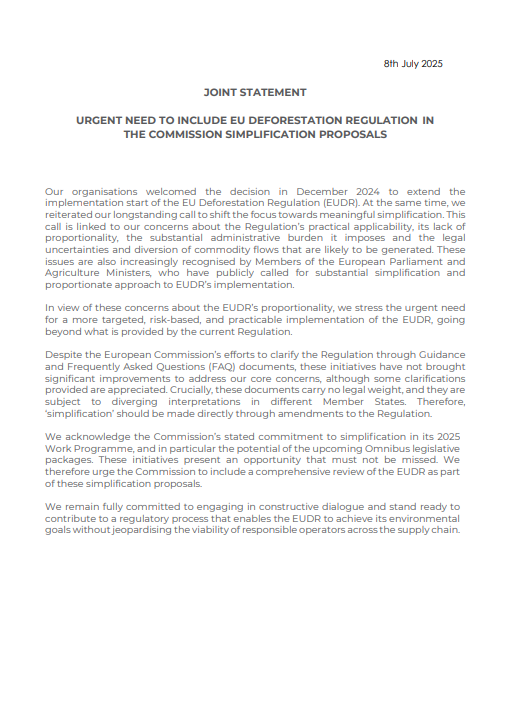16 organisations call for the inclusion of EUDR in the Commission's simplification proposals
Our organisations welcomed the decision in December 2024 to extend the implementation start of the EU Deforestation Regulation (EUDR). At the same time, we reiterated our longstanding call to shift the focus towards meaningful simplification. This call is linked to our concerns about the Regulation’s practical applicability, its lack of proportionality, the substantial administrative burden it imposes and the legal uncertainties and diversion of commodity flows that are likely to be generated. These issues are also increasingly recognised by Members of the European Parliament and Agriculture Ministers, who have publicly called for substantial simplification and proportionate approach to EUDR’s implementation.
In view of these concerns about the EUDR’s proportionality, we stress the urgent need for a more targeted, risk-based, and practicable implementation of the EUDR, going beyond what is provided by the current Regulation.
Despite the European Commission’s efforts to clarify the Regulation through Guidance and Frequently Asked Questions (FAQ) documents, these initiatives have not brought significant improvements to address our core concerns, although some clarifications provided are appreciated. Crucially, these documents carry no legal weight, and they are subject to diverging interpretations in different Member States. Therefore, ‘simplification’ should be made directly through amendments to the Regulation.
We acknowledge the Commission’s stated commitment to simplification in its 2025 Work Programme, and in particular the potential of the upcoming Omnibus legislative packages. These initiatives present an opportunity that must not be missed. We therefore urge the Commission to include a comprehensive review of the EUDR as part of these simplification proposals.
We remain fully committed to engaging in constructive dialogue and stand ready to contribute to a regulatory process that enables the EUDR to achieve its environmental goals without jeopardising the viability of responsible operators across the supply chain.
On behalf of the following organisations:
APAG – Oleochemicals Europe
Bioenergy Europe – European Bioenergy Association
CEI-Bois – European Confederation of Woodworking Industries
CEPF – Confederation of European Forest Owners
COCERAL – European association of trade in cereals, oilseeds, rice, pulses, olive oil, oils and fats, animal feed and agro-supply
Copa-Cogeca – European Farmers and Agri-Cooperatives
COTANGE- Confederation of National Associations of Tanners and Dressers of the European Community
EFIC – European Furniture Industries Confederation
ELO – European Landowners’ Organization
EOS – European Organisation of the Sawmill Industry
EPF – European Panel Federation
EPLF – European Producers of Laminate Flooring
FECOF – European Federation of Forest Municipalities
FEFAC – European Feed Manufacturers’ Federation
FEP – European Parquet Federation
UECBV – European Livestock and Meat Trading Union


